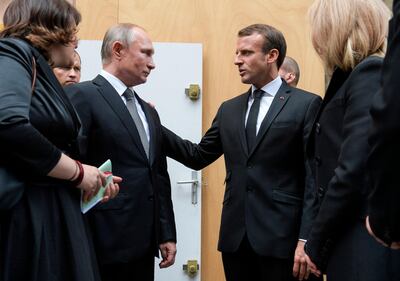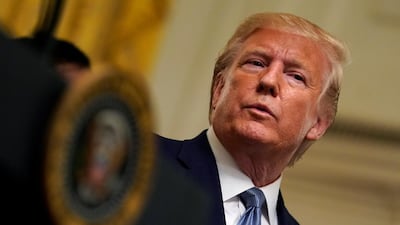Heads of governments around the world will be watching closely as Donald Trump prepares for what could be the toughest domestic challenge of his presidency. Such is the influence of his office, there is a strong possibility that the impeachment investigation under way against the US leader will be forcing friends and foes abroad to recalibrate their approaches to dealing with his administration.
The US House of Representatives has launched a probe against Mr Trump after evidence mounted in recent days that he illicitly used his office to enlist the help of Ukraine's President Volodymyr Zelenskiy in order to damage Joe Biden, a Democratic Party presidential rival, in exchange for military aid. As a result, questions abound with regard to the fate of Mr Trump's presidency, including whether he will be re-elected in 2020 even if he manages to evade impeachment.
There is every chance, of course, that Mr Trump will overcome this challenge – as he has others during the past three years in power. And while there may be concerns over how he conducts foreign policy during the next few weeks and months, it is likely that adversaries and enemies of the United States will have sensed a golden opportunity to extract concessions from a president currently under severe duress. For instance, the trade war between the US and China continues unabated and, even as Mr Trump has proved effective in getting the Asian superpower to the table, the question is whether Xi Jinping's administration can apply pressure on the American trade negotiation team while its president is distracted by the impeachment proceedings.
Ironically, though, the timing of the inquiry could prove fortuitous in bringing peace to the Middle East.

How to solve a problem like Iran has been, perhaps, the foremost question on the minds of foreign policy experts over the past four decades – but especially since Mr Trump cancelled the nuclear deal his predecessor Barack Obama had signed with Tehran in 2015. Under Mr Trump’s leadership, the US has taken a more hardline stance against Iran, stating that the nuclear deal was not comprehensive enough and that it did little to curb Tehran’s ambitions to grow its influence in the region with the help of its proxies. Sanctions applied by the Trump administration have also crippled Iran’s economy. But rather than returning to the negotiating table, Iran has gone on the offensive in the Strait of Hormuz by seizing tankers, while Iranian-backed Houthi forces in Yemen claimed to have launched drone attacks on oil facilities in Saudi Arabia.
Given the position world leaders find Mr Trump in at the moment, however, some of those vested in the idea of a rapprochement between the two countries have stepped into the breach, seeing an opportunity to continue down the path of dialogue and diplomacy. President Emmanuel Macron of France, backed by Russia’s President Vladimir Putin, is said to be pushing for a new agreement to be drafted between Iran on one side and the five permanent members of the UN Security Council, plus Germany, on the other. Details of the deal remain under wraps but, in principle, it is likely to be based on mutual concessions by the US and Iran. The latter would agree to negotiating a new deal in return for the US agreeing to a financial mechanism that would allow Iran to sell its oil and legally circumvent some US sanctions, which would not be lifted entirely. Iran would also be urged to take another look at its controversial ballistic missile programme while curbing its incursions in the region.
There were setbacks in this regard in recent times, either due to what was perceived as US intransigence or Iranian recklessness in the Middle East. Attacks on Saudi oil installations, allegedly with the use of Iran-made drones, forced European powers to distance themselves from Tehran while the US imposed more sanctions – including on the Central Bank of Iran. However, Mr Putin has reportedly asked Mr Macron to step up his efforts, while the Russian leader urged Iran's President Hassan Rouhani to avoid further escalations in the region. According to sources, Mr Putin gave Mr Rouhani a guarantee to increase bilateral trade as well as Iran's possible inclusion in the Eurasian Economic Union in return for peace. Meanwhile, there have also been suggestions that the US would gauge the situation in Yemen, where there is a bloody war under way, as a litmus test by which to judge Iranian behaviour in the region – in return for facilitating Mr Macron's initiative. According to sources, Iraq's Prime Minister Adel Abdel Mahdi travelled to Saudi Arabia last month to explore the prospect of a Saudi-Iranian rapprochement in the Arabian peninsula.

What we may be witnessing, as a result of the initiatives taken by Mr Macron and Mr Putin, is a period of relative calm in the region – at least for the time being – with sources close to the Iranian leadership suggesting that the Islamic Revolutionary Guard Corps would relent until late November before resuming its attempts to escalate tensions in the area. The domestic scene in Iran is reaching a boiling point and the regime fears that this could turn into an uprising unless it rescues its economy. The IRGC’s assessment is that the regime has two months for sanctions to be lifted, at least partially, before the economy collapses – which might force Tehran into a military confrontation abroad in order to garner public support.
The relative calm among Iran’s leaders suggests that a breakthrough, being brokered by the European powers, could be made with regard to facilitating Iranian oil exports as part of a deal with the Trump administration. And while there is little chance that the US will lift all its sanctions on Iran, the possibility of smaller deals being made shows that the power of diplomacy is very much alive even when one or both parties concerned are in a position of weakness. Remember, just as Mr Trump has his challenges at home, so does the regime in Tehran – given the state of the economy. Whether this will indeed translate to peace and stability in the Middle East, we will have to wait and see.


